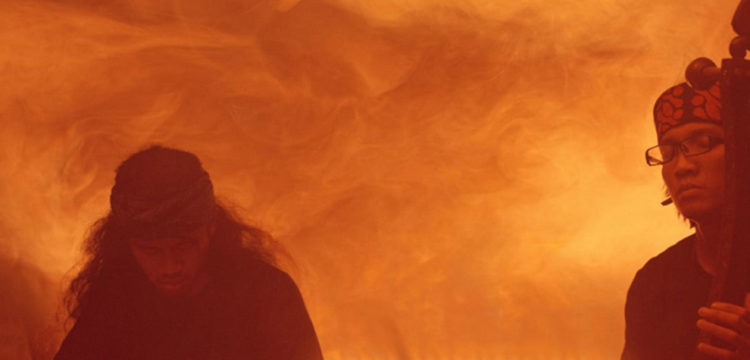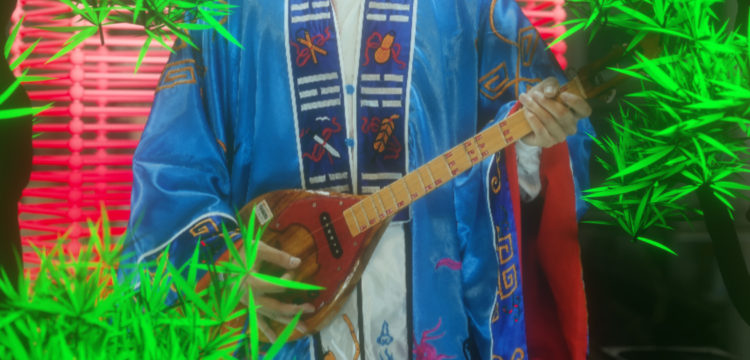Kim Through the Looking Glass
On propaganda, K-pop, populism and Laibach in North and South Korea
The following essay is an excerpt from the book Kim. The rise and fall of the dynasty, a project by Antonio La Grotta. Kim is a surreal musical comedy in 5 acts—each act begins with a song—which tells the most secret state in the world through the stamps and postcards issued by KCNA, the central news agency of North Korea. In the book the relationship between the images and the selection of incredible newspaper articles on the Kim published on the web (the attribution of the invention of the hamburger, the discovery of the unicorn’s den…) contribute to creating and reinforcing that aura of mystery and incredible surrounding the country.
North Korea is seductive, the thrill it provokes is as deplorable as it is irresistible. It’s perceived as a mystery, but trying to decipher the relationship with its enemy and twin—South Korea—can be revealing. In fact, the entire Korean peninsula has a peculiar allure for fanatics, it seems casting a spell, a sweet swindle, living and thriving on both sides of the 38th parallel, a border more precisely identified by the DMZ, the Korean Demilitarized Zone. A border that functions as a mirror.
An example of this parallel dynamic emerges from what happened during the first months of the Covid-19 pandemic, when the traditional celebration of the Day of the Sun—the birth anniversary of Kim Il-sung on April 15th—unfolded in the same fashion as ever, by launching missiles tests. Meanwhile, on the other side of the border, South Korea was launching drive-in Covid-19 tests and—behaving as a proper democracy—holding legislative elections, confirming the incumbent president Moon Jae-in of the Democratic Party. Rituals as usual, in accordance to their true essence, or mandate at least: on one side «the evils» showing their weapons, on the other one «the righteous calling all citizens to the polls. Normality, despite the extreme times.
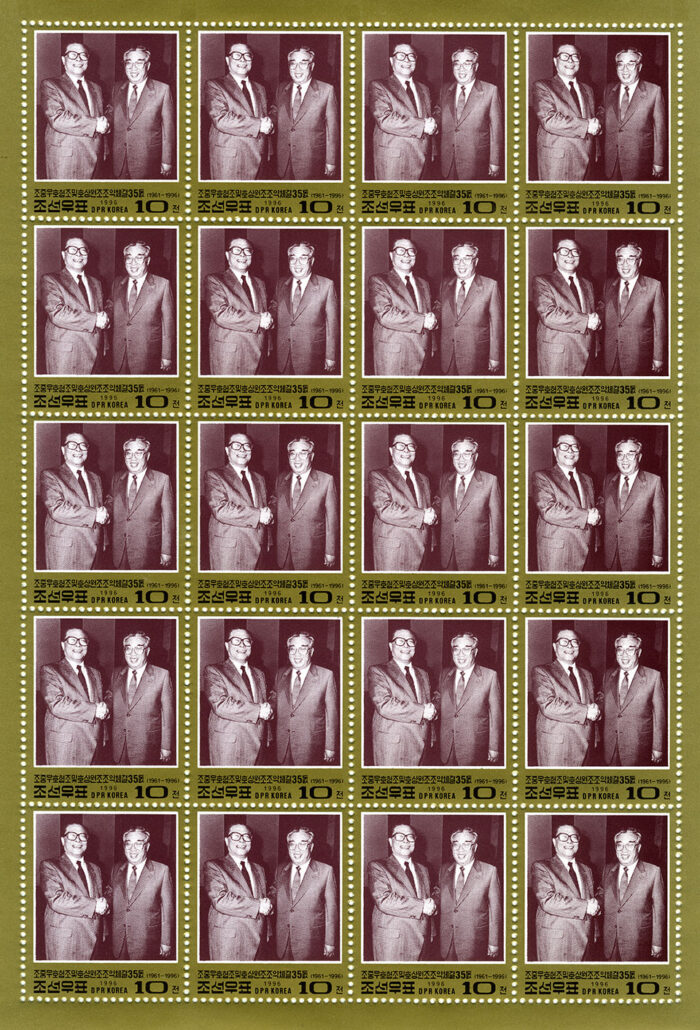
General knowledge about the two nations is strictly codified, especially if we enter the realm of pop culture. As we know, the Korean wave—often referred to as hallyu—saw the increase of global popularity of South Korean culture since the 1990s, flooding the world with K-pop and K-dramas, spreading industrial lines of goods such as cosmetics, accessories, and haircuts. Looking at North Korea, the show is offered by the Kims themselves, a staged act which triggers a compulsive kind of attraction. Let’s take the series of stamps and postcards here collected: they seem designed to feed an existing craving, desperately asking for more gossip and hidden secrets regarding the Kim family. This book enriches the mystery. It’s a luxury gift box with assorted chocolates, different flavours for the gluttonous ones.
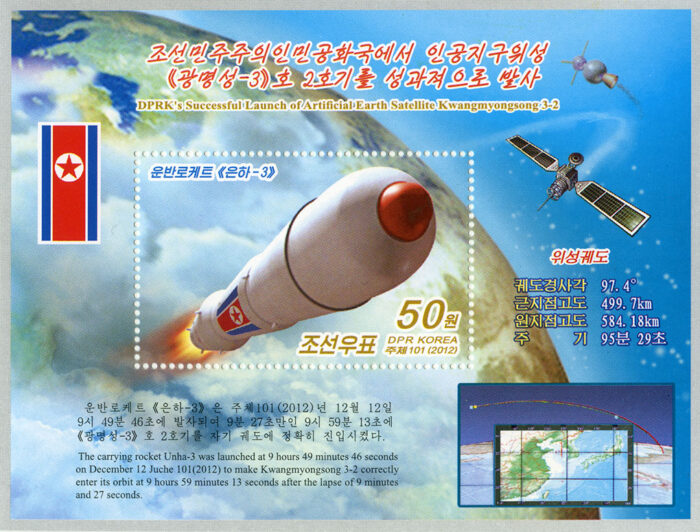
Flipping through pages we enter the universe of Juche, the official ideology of North Korea stating «self-reliance» as the revolutionary tool that the Korean masses must adopt to realise true socialism, according to the will and vision of Kim Il-sung. With a kind of reverse effect, totalitarian version of the fandom-infused idolatry generated by the K-pop’s industry, the leadership can’t simply rule the country to achieve such an endeavour, but it has to perform their ruling in a perfect show built on epic narratives and grand backgrounds: the «discovery» of a lair belonging to the unicorn mounted by the ancient King Tongmyon, Kim Jong-un riding a white horse up Mount Paektu, «the sacred mountain of the revolution» manifesting the spirit of the country through portentous natural phenomena, they say. Even though the Kims didn’t reach immortality, when Kim Il-sung died aged 83 years old, temperatures plunged, bears mourned and flocks of magpies celebrated the «eternal President of the Republic», according to North Korean state media. Such a perfect plot for a Hollywood blockbuster! The paranoid obsession around the leader’s body, his presence and absence (in April 2020, Kim Jong-Un had disappeared from public view just for a few days when rumours have started to circulate that he may be seriously ill, or even dead), has led to a maniacal attention to aesthetic details, perfected more and more by the young Supreme Leader Comrade, with his glasses, walking sticks, and iconic haircuts. The leaders always look good.
One hypothesis to unveil this dual status inherent in the North Korean regime—and underlying in all regimes—may come from the infamous Laibach’s concert in Pyongyang on August 2016. Announced as «the first-ever Western rock group to perform in North Korea», it can be regarded—according to philosopher Slavoj Žižek—as «the most fascinating cultural and ideological, political event of the XXI century, until now», because «it was a totally impossible encounter of two totally different worlds which are nonetheless at some deeper level echoing each other». Throughout their career, Laibach embodied the ambiguity of Western pop industry regarded through the lens of the totalitarian State. This is shown through the repetition of gestures, slogan, choreographies, uniforms—be them pop-star uniforms or workers uniforms, what’s the difference? As Žižek points out, there’s a radical misunderstanding of Laibach’s oeuvre: they were not simply mocking the totalitarian style, they brought out the authoritarian feature which is present in all societies, even the more democratic.
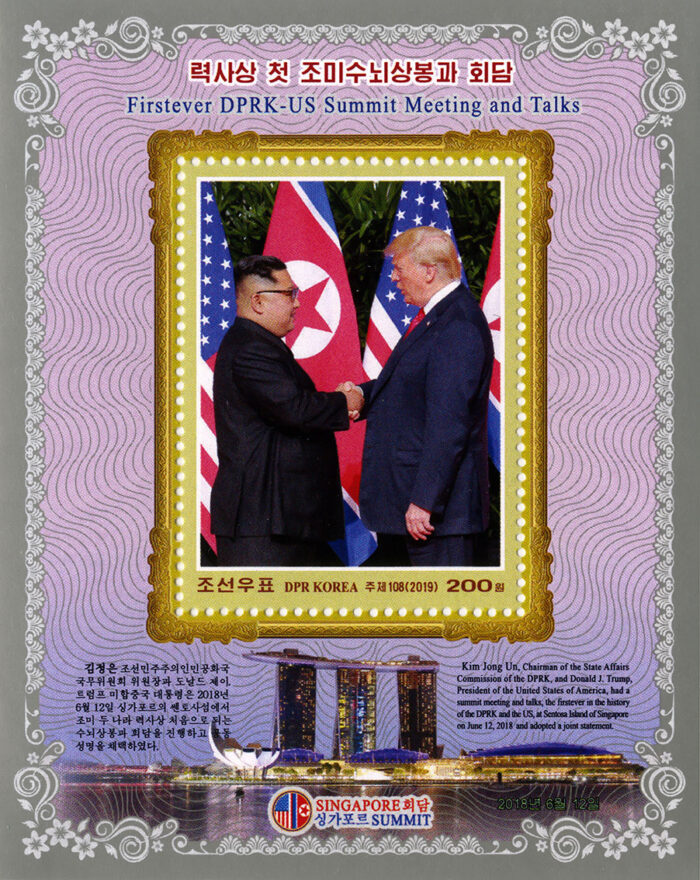
What Laibach staged in North Korea is the monstrosity that lies within the other, not the misleading transgression and freedom of rock music, or a parody of the style of regimes, but the problematic exercise of power that lies in democratic societies. With the appropriation of the dictatorship ways of communication, they explain both the totalitarian aspect of Western pop culture and the spectacular side of the totalitarian State up to make them overlap. A hit like Gangnam style by famous K-pop star PSY isn’t less populist than Arirang, a folk song in praise of peace and often considered the anthem of Korea (on both sides), that not surprisingly Laibach decided to perform at Ponghwa Theatre with great approval of the audience. All these public performances are loaded with a cult of personality or ideology addressed at collective expectations. That’s why it’s so accurate that this book is built like a musical comedy.
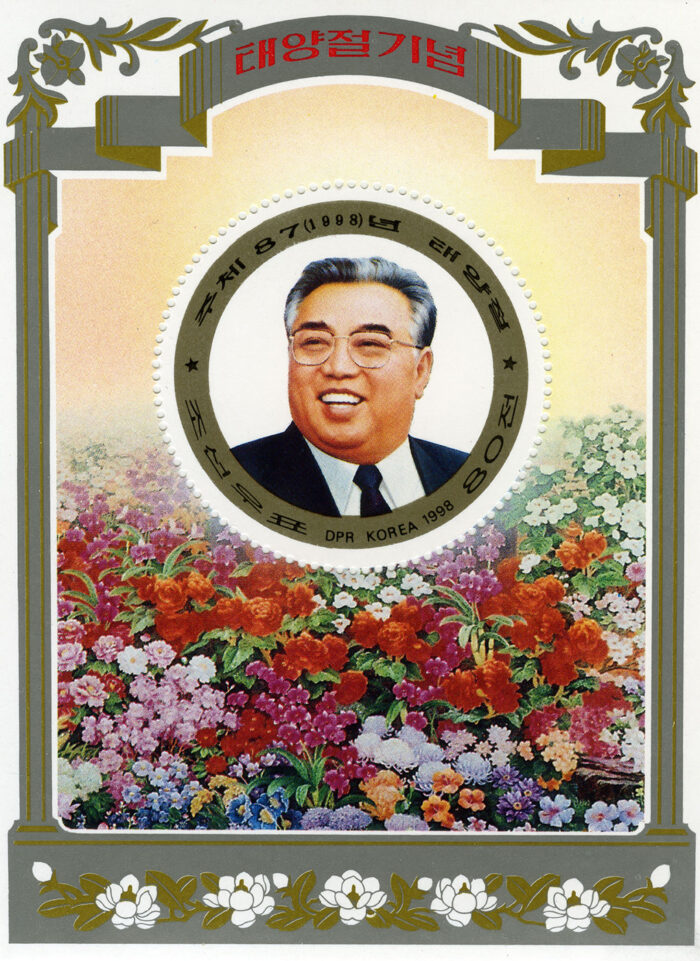
As in the old stories from the showbiz, with the typical figure of a legendary impresario and his descendants, also the North Korean regime is a family business constantly busy at shaping and modernising its brand to make people feel part of a bigger whole, a cohesive path originating from a myth. International media, apparently working as a communication agency for North Korea, adopted an epithet which was originally coined for unified Korea in the 1800s, «the hermit kingdom», the perfect title for a HBO product. Over decades, as in the best reboot of a film saga, the dynasty has essentially refined the canon of regime propaganda, defining it down to the smallest detail of its topoi. As in Star Wars, you just have to decide if Kim Jong-Un is Darth Vader or Luke Skywalker, and that depends if you’re on this or that side of the looking glass stuck at the 38th parallel. Whatever the side, the Kims offer the best fan-service and never let you down.
As part of this complex marketing operation, one of the latest acts of renewal concerned one of the basic modules of North Korean internal propaganda: a brand new regime-sponsored all female pop band was launched, the Moranbong. Fresh young and wearing mini-skirts, they’re conveying socialist values and contents with pop manners. The machinery of South Korean pop culture fits North Korean propaganda. Choosing to adopt it, rather than showing a loosened grip, demonstrates an effective mutualisation of methods. Forms of expression thriving in a democratic and free environment come handy in a totalitarian regime. It is evident that the representation of a State guaranteeing protection and security is sufficient to convince the people, its guidance is perceived as a solid one if it’s able to craft comforting rituals, an ability which is especially perfected when the emergency becomes the norm. Be afraid.


